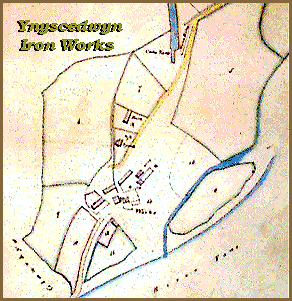
Upper Swansea Valley
The Story of Iron 4
by Len Ley
In July 1837, Richard Douglas Gough leased the Ynyscedwyn Iron Works, together with the mineral rights and the house Tycoch to George Crane. A branch canal had been cut connecting the works to the main Swansea Valley Canal and this together with the developing tram roads, constituted a very effective means of haulage.
Plan of the Iron Works from the Ynyscedwyn estate records. (Note the spur of the Swansea Canal at the top of the image)
By kind permission
of the West Glamorgan
Record Office
(ref. D/D/Yc 1175)
 The works
continued to prosper under Crane, and by the year of his death
in 1846 the seven furnaces were all in blast and the production
of Anthracite Iron was rising rapidly and sustaining Ynyscedwyn
as a major iron-making concern. Never the less, it was shortly
to be overshadowed by the recently completed iron works at Ystalyfera,
then operating the hot-blast method at full capacity and expanding
rapidly.
The works
continued to prosper under Crane, and by the year of his death
in 1846 the seven furnaces were all in blast and the production
of Anthracite Iron was rising rapidly and sustaining Ynyscedwyn
as a major iron-making concern. Never the less, it was shortly
to be overshadowed by the recently completed iron works at Ystalyfera,
then operating the hot-blast method at full capacity and expanding
rapidly. collections of
the late
John Morris

Cover of the Rule Book of the Iron Company's collieries
Powys
County Archives

This entry from the records of the Breconshire Quarter Sessions is a stark reminder of just how different working conditions were at the time of George Crane. Here one George Jones is imprisoned for two months with hard labour at the complaint of Mr Crane for leaving his employment when contracted.